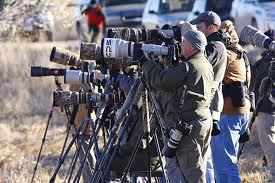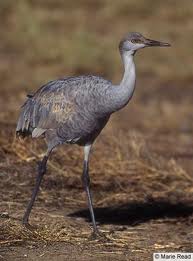An Experience at Bosque Del Apache with Expensive Cameras to Capture a Single Moment →
by Brent M. Jones
The Bosque del Apache National Wildlife Refuge is about two hours south of Albuquerque, New Mexico. You drive to Socorro and another 11 miles to San Antonio, where an 8-mile loop road follows the Rio Grande River and the refuge.
"Woods of the Apache" means "The Bosque Del Apache.” "Bosque" is a word borrowed from Spanish, meaning the forest or woods, referring to the habitat found on both sides of the Rio Grande River.
Over 350 bird species have been observed in the Bosque del Apache, where vast flocks of wintering cranes and geese are the refuge's most exciting feature.
The Sand Hill Cranes are large tall birds with long legs and necks. They pair up for life and usually have one or two chicks. These birds migrate from Canada, Montana, and Utah in the winter, and they will fly a chick South for the winter to teach them the way and encourage the offspring to be independent.
November to late February is the best time to see large numbers of birds in the Bosque del Apache when typically over 10,000 Sandhill Cranes and 20,000 Ross's and Snow Geese can be seen. Sunrise and sunset is the best time to see the bird while they roost in the refuge before leaving in the morning to feed or after returning from the fields in the evening.
We spent a couple of days at this refuge a few years ago in the late fall. We had been told by a friend to watch the birds in the morning after sitting overnight roosting on the water and waiting for when the first ones take off. When the rest then all at once follow the sky fills and that is the time for the best pictures.
We were excited and hoped to see them all get up into the air at once, but it turned out that the birds flew in several groups, not just one.
The road edge near the roosting birds was lined with people holding big cameras with huge, expensive, telescopic lenses. Plenty of tripods topped with Nikon and Canon cameras where the lens alone can cost between $2500 and $12,000, and even more line the nearby road with professional bird watchers. Some had camouflage pants and jackets.
Like birds, the people would move in groups up and down the road. One guy would break first from the group, and then it seemed like all the others would follow.
We did see some people, amateurs, and first-timers, just watching, like we were doing, so we found our way into their little groups. We folks with the smaller lens, and even just with iPhones, just didn't fit in, and some walked around alone to not be embarrassed.
It was mostly the men that had the "big" lens with extensions and tripods. It also seemed like the women appeared much later and stood in their groups.
We were one of the first on-site at "The Bosque Del Apache" that special fall day, arriving early morning before the sun rose. When the light broke, it was amazing to see how many birds were there.
The birds, the professional photographers, and all those watching were a treat.
It Just Wasn't My Time as it Turned Out →
By Brent M. Jones
I had five trips to the hospital for a heart attack between 2009 and 2016. Two trips were false alarms, but I still made it to the operating table 4 times.
The first trip was a complete surprise. I got up and started getting ready for work. The week before, I had been in a group of volunteers that worked with older people, and we were given instructions on heart attack symptoms. I had acute pain in the middle of my chest, the inside of my arm hurt, I felt nausea, and just dizzy overall. I had made it downstairs and was sitting in the kitchen and just wasn’t sure what was happening, so I said a little prayer and asked if I had a heart attack and if perhaps I could recognize another symptom. I felt a cold sweat within a few minutes, so I went upstairs, told my wife, and got into bed.
The surprise of all this started to sink in when 8 EMTs arrived in my bedroom, lifting me onto a stretcher and carrying me to the ambulance. I couldn’t stop thinking about how surprising it was that I had had a heart attack. Laying on the stretcher, I looked up at the lady EMT leaning over and taking care of me and said, “I just don’t understand why this is happening; I have run 13 marathons in my lifetime?” She looked down at me and said, “Maybe it is just your time.” I didn’t laugh at the time.
Being wheeled into an operating room is frightening. They slide you onto a cold stainless-steel table where you lay, almost naked, in the middle of the table. The room has many people, all seeming to be doing something important. The staff was young, professional, and engaged in some good-natured banter.
On my last trip to the cold steel table, the first thing that caught my attention was that the music seemed to be a little loud. By this time, I had my heart doctor, but he was not on-site, and when I met the doctor, it seemed like he was so young he could have been my grandson. Everyone was very busy, and I just lay waiting for drip anesthesia to be set up. From the comments and the volume, it seemed clear that all those young folks walking around were enjoying the music in the background, but at least they weren’t staring at my naked and cold body. A young man came over and said he would get the anesthesia set up soon, a good thing I thought, but he wondered if I had some favorite music saying he would find it and play it. Well, I still had my thoughts in place, so I suggested Leonard Cohen, figuring it was a long shot. Not one person in the room had heard of him, nor could they find any of his music even though they made an effort to see him. I thought it was funny and might have chuckled, but I was out soon after that.
My last trip to the hospital was one where they again picked me up with the ambulance. The ambulance sat in our driveway in front of the house after I had been in for a while. A fire engine crew and a support car team were on-site with us, and several paramedics regularly checked the back of the ambulance; they would greet me and ask how I was doing. One of these guys seemed to have paused for a few minutes, so I looked up at him and told him I still remembered getting help like this the first time I had a heart attack telling him about the question and the reply I got from the EMT nurse about it “being my time.” Neither of the two paramedics said a word or even changed facial expressions. They just seemed like they had kicked into gear and were about some important business. I noticed that the one paramedic left the back door ajar as he left, I saw him go over to a group standing by the fire engine where they seemed to huddle and laugh, and then he went to a different group. I figure this was a good sign. The last heat attack event had a connection to the first. It still wasn’t my time.
Our Life Story Creates our Identity →
Whenever I think about my life story, I rethink what happened and draw new conclusions. The following story didn’t happen in a boxing ring. I wish it had because I might have done better, but the story has stuck with me throughout my life.
When I was about eleven years old, I had the unfortunate experience of being chased home each day after school by a kid called Allen, who was much bigger than me. One day my mother met me as I was running into the yard. She had probably noticed I was out of breath on my return each day. That day she asked why I was running so hard, and I told her Allen was chasing me. I could have said, “I was running to avoid getting pounded.” That would have been an honest answer.
We lived by a river, and crossing the bridge in front of our house meant I was home. The next day my mother was out front, waiting for my arrival as I crossed the bridge. She stopped me there, and when shortly Allen came thundering across, she called him over and announced to us both that the following day we would meet right there in the park across the street from my house and fight. The announcement surprised me. What surprised me even more, was my mother setting this fight up. Looking back, it also amazes me that I didn’t try to get out of it or worry about it. I just figured that was what I had to do. I had to fight him.
The next day at school, word got out. Some asked me the kids if I was going to fight him. I said yes, I was. After school, Allen arrived at the park with a crowd of kids from school, some even before I arrived. My mother was there, waiting. She had all the kids that had shown up from a big circle. Allen and I entered the ring with fists, ready to start swinging, and Mom was the referee. I still remember looking at Allen, who was much taller and heavier than I was, and not feeling afraid.
The fight began, and I danced around with my fists, trying to land some punches and trying harder to avoid getting punched. I hit him as hard as I could a few times. I had boxed with my dad in the evenings and understood a little about the process, but Allen didn’t look like he even felt my punches. He wasn’t very good at boxing and preferred to push and shove, several times jostljoltingo the ground before jumping on and pounding me. Even lying flat on my back, I would hit whatever part of his body I could connect with. Each time we landed on the ground, my mother had us get back up and continue boxing. It wasn’t a fight; I stood a chance of winning. Finally, my mother held Allen’s hand and said, “There you go, Allen, you won!”
What has always surprised me most then, and ever since, is that I wasn’t scared. I felt like I did my best and didn’t hurt too badly. I lost my fear of failing. Life went on. I did get into a fight or two in later years at school and did much better.
When I tell this part of my life story, it seems to be a meaningful connection and even explains many of the future challenges and changes I have had in my life. I have not been afraid of failures but have worked through them over the years. I learned that when you get knocked down, you get back up, you keep fighting, and when it is over, life goes on.
By the way, a side note. I have always loved boxing. Watching it, in particular. Muhammad Ali is my favorite boxer, and this quote of his has specific relevance for me:
“Only a man who knows what it is like to be defeated can reach down to the bottom of his soul and come up with the extra ounce of power it takes to win when the match is even.”







